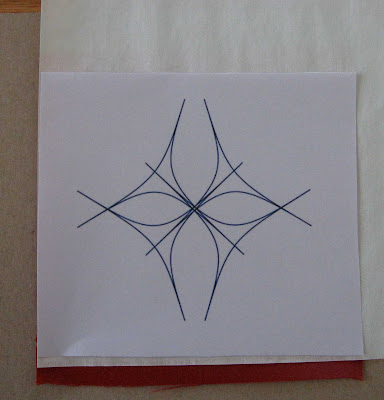
One process that often stumps new hands to embroidery is how to mark the pattern on the fabric before you stitch.
Today I have a small tutorial on two of the many ways you can do it.
Method 1
I use a product called Transdoodle but you can also use dress makers carbon. Transdoodle is a chalk based transfer paper that produces very clear and fine outlines. It is described as being non-waxy non staining, and reusable. Another big advantage is that the lines will not set even if you accidently iron it! Also, should you ever want to, you can use it on other materials such as metal or ceramics, you can.

Usually with hand embroidery your stitchery covers any marking lines, but should you need to remove the marks you simply wipe with a cloth or wash the project. If your project will not take kindly to water simply rub out the chalky line with a scrap of fabric. Transdoodle comes in a number of colours including white so you can transfer designs on to dark fabrics with ease.
You use Transdoodle as you would dressmakers carbon (which you can also use to transfer embroidery designs)
Place the sheet of Transdoodle chalky colour side down on the fabric. Then line up your pattern on top.
Trace over the pattern so that pressure from the pen transfers the design. Make sure you do not shift the design as you work.
When you lift off the Transdoodle sheet you have a design transferred to the fabric ready to stitch
Method 2
This is the second method I use. It is quick and simple but this trick will only work for light coloured fabrics that have a smooth weave.
I tape the design to a window.
Over the top I tape the fabric
As you can see this allows me to see the design well enough to trace it.

With a quilters pencil or a marking pen I trace the design.
If you use a marking pen make sure it is one of those that will fade or disappear with moisture or time. Also some of the blue marking pens can leave their mark so I steer clear of them .
Don’t iron your work as you will set the transfer marks.
These small images are the finished samples. I hope you find this small tutorial useful.
Have Pintangle delivered to your inbox when I update
You can have Pintangle delivered to your inbox by using the follow feature in the sidebar. Just enter your email address, and when you get the confirmation email make sure you say yes, then you are all set!







It is sort of similar but I find it works on more materials (its a bit more waxier in feel) I use it because I find it leaves a cleaner mark.
I purchased Clover brand Tracing Paper – (Clover Chacopy) from spotlight I guess it is similar to what you used. A five colour pack of papers is about $6 or $7.
I really like your blog. I've just found it by following a link from Nenah's needle. I am new to needlepoint and have the bug. Now you've go me thinking about how to combine with quilting which I've been doing for several years……Thank you!
Yes, Joann’s carries it, but online only. I’ve also seen in advertised at K-Mart. Many quilt shops carry it, as well.
Loretta
I am sorry I don’t know if JoAnn’s carries it as I am Australian and don’t really even know what JoAnn’s is – I am guessing it is a needlework/sewing chain as I often see it mentioned. Sorry I can’t be of any help but ask them
Do you know if JoAnn’s carries transdoodle? I’m going to have to get me some of that so I can finally do this project on grey fabric that I’ve been holding off on.
Anne I don’t understand your question because if you read the article I do not mention – no did I use interfacing. Sorry I need clarification.
Hi, I would like to know, do i put the iron-on interfacing on the fabric before i embroider or after i finished embroider?
Warmest regards,
Ann
I am a beginer in Hand embroidery. My 88 year old mother has been doing this since I was a child and now I have caught the bug! TRANSDOODLE SOUNDS AMAZINGI I love flowers and nature and with this product I can trace nature at its best. Thank you thank you thank you! your web site it great. Sure appreciate all that you are doing.
Sharon, I’d never heard of Transdoodle, sounds like it comes from the hard crafts side of the spectrum if it can be used on ceramics etc. Might be a useful addition to the tool box for certain uses. Thanks for the info.
I will just briefly say that most tutors at the Embroiderers’ Guild NSW do NOT recommend the blue or purple pens for marking white or light coloured embroidery articles due to the variation in quality from different brands and unreliable removal even after washing of some blue pens. HB pencil used with a light touch is the most recommended method or "tack and tear" on textured fabrics.
Thanks for sharing, as always you are a fount of information, VBG.
Hooroo,
Christine
http://missmuffettwo.blogspot.com/